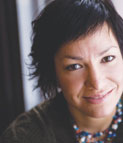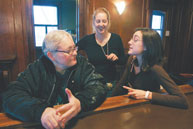In focus
Waneek Horn-Miller: Athlete and advocate
Education can mean many things. Just ask Waneek Horn-Miller. The 29-year-old Director of First People's house has a BA in political science from Carleton but views her own learning experience on a much broader plane. For Horn-Miller, her education includes the strength she gathered as an Olympic athlete and the wisdom she learned growing up in the shadow of the longhouse as a full-blooded Mohawk. Education comes from many sources, a message Horn-Miller wants to share with McGill.

Horn-Miller won waterpolo bronze at the 2001 World Championships.
Claudio Calligaris
Horn-Miller took up her post last summer at First People's House, a laid-back and cozy space on Peel St. for the university's aboriginal students. She is easygoing and polite but it's easy to sense the determination and ambition that made her co-captain of Canada's water polo team in the Sydney Olympics in 2000 and a successful reporter, public speaker and model.
Horn-Miller is frank about the social dysfunction that can characterize life on many reserves but her response is to neither anger nor victimhood. Instead, she talks about using higher education to empower her people.
"Education was always part of our reality, is our future and it is the key to our success as native people. We're talking about encouraging universities to take account of our perspective."
The prospect of a more cross-cultural education at McGill would provide a sense of recognition for native peoples and create more aboriginal role models within the community. But Horn-Miller also sees some very practical ways by which the university could improve quality of life for native communities.
One would be to make the university more relevant to first nations communities by drawing on the strengths of McGill's athletic programs and sports medicine research. Why not use sports as a means of recruiting aboriginal youth who believed a long shot at the pro leagues was the only outlet for their athletic prowess? And what about setting up an interdisciplinary project on aboriginal health that would examine whether fitness programs might mitigate the diabetes epidemic on many reserves?
"Imagine McGill as a centre for aboriginal health and sports," she says. "McGill could become a vanguard [in the field]."
Horn-Miller's advocacy for sports is hardly theoretical. Growing up, too often her experiences and sense of self were defined through the prism of race. But on the track and in the pool, she had a forum where achievement mattered more than skin colour. And later on, the strength she acquired from Olympic training helped her persevere whenever life dealt a challenge.
Horn-Miller's Olympic career also delivered another unexpected benefit. At the closing ceremonies at Sydney, she met a judoka and today she and three-time Olympian Keith Morgan are engaged. She likes the prospect of getting married and, though she still misses the all-consuming passion of Olympic training, Horn-Miller is enjoying the opportunity to reconnect with other parts of her life.
"I missed a lot of birthdays, births and deaths, and cultural fests. Sports were my number one priority for 19 years. But now it's at a different level on my list of priorities."
As athletic dreams recede, Horn-Miller is now sailing on the new dream of helping the next generation of aboriginal youth reach the highest level of the academy. Inspired by her own family (her sister is on track to become the first Mohawk woman doctor in Canada), she senses a new era of sky-is-the-limit ambition for aboriginals in which young people seek not just to enter university, but plan to become the professor and the dean as well.
"We have a lot to contribute - we have a lot to teach you about this world. In Canada, when we're an integrated society, we'll be as successful as we can be."
Best buddies make fast friends

Alivia Dlugopiat hangs out with Leigh Bryant and Christina Strong at Thompson House.
Owen Egan
It has to be one of the more unusual friendships forged at McGill. Christina Strong is a vivacious 21-year-old from Minnesota who is studying international development and French translation at McGill. Alivia Dlugopiat is 51 and lives in Côte-des-Neiges with a part-time roommate who provides a little assistance to help her overcome her intellectual disability. Different worlds to be sure, but Christina and Alivia count each other as a close friend.
The two have been hanging out for four years now, meeting for coffee on Saturdays, and sometimes playing frisbee or going to a Habs game. They first got to know each other at a meet and greet event hosted by Best Buddies, one of the more remarkable student groups here on campus. Since the McGill chapter opened in 1998, the organization has fostered hundreds of new friendships between students and cognitively impaired adults.
"One of the things we enjoy a lot is getting out of our normal area of town and sharing other parts of Montreal together," says Strong, who is this year's campus coordinator for Best Buddies.
"It gets you outside of the McGill bubble by getting to know a social sphere outside of your own. It reminds you that there's more out there than your tiny student world and it puts your life in a broader perspective."
For people like Dlugopiat, Best Buddies is a welcome opportunity to mingle with a new crowd. Like anyone else, she gets tired of seeing the same old faces at her group activities, and relishes spending time with Strong and her friends, and attending the social events where different groups of Buddies come together.
"It gets me out of my house for a few hours, especially in wintertime. Otherwise, I'm stuck in the house all winter. I'm glad not to be alone all the time."
Dlugopiat goes on to confide that Tim Hortons is a popular haunt among the Buddies, especially when different pairs meet up together. Like many of their student friends, intellectually disabled adults are often on a tight budget, and nursing a cup of coffee for an hour or two is a great way to get out without spending a lot of money.
But while going for coffee is all well and good, it's the Valentine's Dance that marks the highlight of the Best Buddies social calendar. "The most anticipated event by far" has many of the Buddies chattering in anticipation many months before it takes place.
"We all dress up in red and everyone goes all out," says Leela Purie-Fawcett, another member who has had a Buddy, Jack Randolph, for the last three years.
The McGill organization currently has 71 full members in its chapter, making it probably the largest in Canada. Among the new initiatives in which it is participating is "e-Buddies," a program that allows members to use the Internet to find pen pals in other places.

